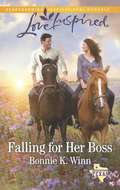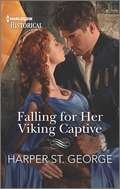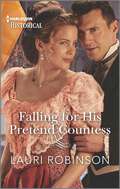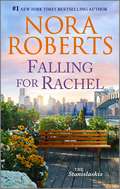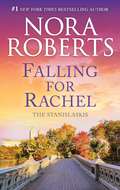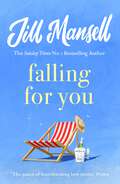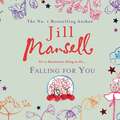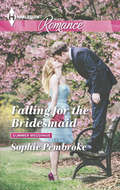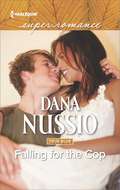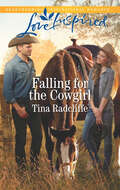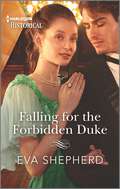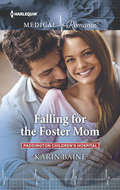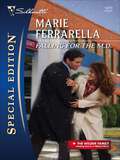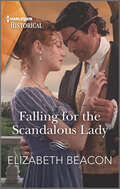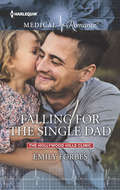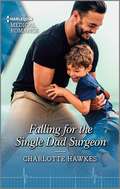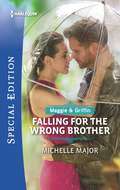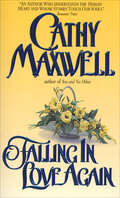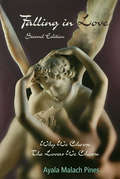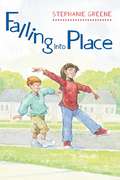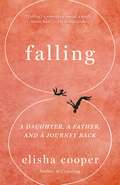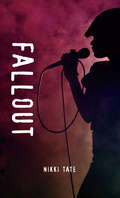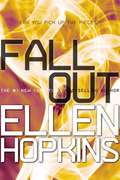- Table View
- List View
Falling for Her Boss
by Bonnie K. WinnFrom Nanny to Mom Tessa Pierce moves to the small town of Rosewood, Texas, hoping to forget all about romance. But her handsome new boss, Morgan Harper, is making that difficult. And his little girl is winning Tessa's heart more and more every day. The hardworking widower barely has enough time for his child, and certainly none for his beautiful new assistant. But when Tessa steps in to help take care of his daughter, she shows Morgan the close-knit family they could be. If he doesn't want to lose her, Morgan will need to unravel her mysterious past and prove to Tessa that her future should be with him.ws Morgan the close-knit family they could be. If he doesn't want to lose her, Morgan will need to unravel her mysterious past and prove to Tessa that her future should be with him.
Falling for Her Viking Captive: Sons Of Sigurd (Sons of Sigurd #2)
by Harper St. GeorgeCapturing the Viking warriorIn her cellar…Lady Annis must stop Viking Rurik Sigurdsson from discovering the truth about his family’s death. Her only solution is to imprison him. But as the ruggedly handsome Viking starts to charm his way out of his cell and into her heart, can she be sure he’s not still intent on vengeance—or perhaps an unexpected alliance is the solution?Sons of SigurdDriven by revenge, redeemed by loveBook 1 — Stolen by the Viking by Michelle WillinghamBook 2 — Falling for Her Viking Captive by Harper St. George Coming soon Book 3 — Conveniently Wed to the Viking by Michelle Styles Book 4 — Redeeming Her Viking Warrior by Jennie Fletcher Book 5 — Tempted by Her Viking Enemy by Terri Brisbin “There is no doubting that Harper St George has a gift, her writing is some of the best I’ve read, she grasp’s hold of your attention and doesn’t let you go not even when the book has finished.”—Chicks, Rogues and Scandals on Longing for Her Forbidden Viking“Harper St. George is a marvel... It really did blow me away, I was drawn into the story within the first chapter. This was wonderful, romantic and rugged… I loved this book so much!”—The Reading Debutante on Longing for Her Forbidden Viking“Harper St. George never disappoints in delivering a well-written story full of wonderful characters, suspense, intrigue, and a romance between two people who truly deserved a HEA.”—Rose is Reading on Longing for Her Forbidden Viking
Falling for His Pretend Countess (Southern Belles in London #3)
by Lauri RobinsonA Victorian romance full of mystery and excitement An intriguing encounter…with the lady next door Henry, Earl of Beaufort, was London&’s most eligible bachelor. Only now someone is trying to frame him for murder! He finds an unexpected ally in his enchanting neighbor, Suzanne, who, after fleeing the American Civil War, also finds herself on the fringes of society. She agrees to help prove his innocence, and a fake engagement provides the perfect cover. Until his real feelings threaten their charade… From Harlequin Historical: Your romantic escape to the past.Southern Belles in LondonBook 1: The Making of His MarchionessBook 2: Falling for His Pretend Countess
Falling for His Runaway Nurse
by Amy RuttanCould a runaway bride……be the one to tempt him?Brooding Thatcher Bell enjoys the anonymity of life as a cruise ship doctor. But when beautiful Lacey Greenwood storms into his life—wearing a wedding dress!—to take up the vacant post as nurse, he&’s shocked by their instant chemistry. Lacey is obviously escaping something, and Thatcher recognizes some of the pain she&’s hiding behind her dazzling smile. But as they set sail, there&’s no way of running from their real and ever-growing feelings! &“I absolutely loved this cute medical romance. This was the perfect mix of steamy romance and medical drama. The instant attention between these two characters was top notch. If you are a fan of the surprise baby trope mixed in with a steamy medical romance this is definitely the book for you!&”-Harlequin Junkie on Twin Surprise for the Baby Doctor &“Baby Bombshell for the Doctor Prince is an emotional swoon-worthy romance…. Author Amy Ruttan beautifully brought these two characters together making them move towards their happy ever after. Highly recommended for all readers of romance.&”-Goodreads
Falling for Rachel (Stanislaskis #3)
by Nora RobertsFrom #1 New York Times bestselling author Nora Roberts comes the third compelling story in the fan-favorite Stanislaski series!For passionate lawyer Rachel Stanislaski, work is her life. Assigned to watch over teenage delinquent Nicholas LeBeck, the last thing Rachel needs is Nick’s hot-headed stepbrother storming into her courtroom. Zack Muldoon is protective and stubborn, but whether he likes it or not, he needs Rachel’s help—both to keep Nick out of trouble and to reconnect with his younger brother. Rachel knows the importance of a family bond, but she hasn’t considered what excitement—or complications—a blossoming romance could add to their agreement. But Zack and Rachel’s chemistry is hard to ignore, and the two could be falling for each other faster than they realize.Previously published.
Falling for Rachel: A Bestselling Romance Novel (Stanislaskis #3)
by Nora RobertsDon’t miss another compelling story in the fan-favorite Stanislaski series from #1 New York Times bestselling author Nora RobertsPublic defender Rachel Stanislaski is a force to be reckoned with. Work is her life, and the last thing she needs is the hot-headed Zack Muldoon storming into her court room. Zack might not like it, but he needs Rachel. She’s the only person standing between his delinquent kid brother and a prison sentence. Zack is used to getting his way—but when it comes to Rachel he might just lose his heart. Originally published in 1993.
Falling for You
by Jill MansellJill Mansell's delicious bestseller FALLING FOR YOU is not to be missed by readers of Katie Fforde and Veronica Henry.Reviewers love Jill's novels: 'Glorious, romantic, heartwarming' Woman & HomeMaddy Harvey was a bit of an ugly duckling as a teenager, what with her NHS specs, unfortunate hair and wonky teeth. Thankfully she's blossomed since then. But when she meets Kerr McKinnon one starry summer's night and discovers, days later, who he actually is... well, that's when the problems really start. Because everyone in Ashcombe knows what happened eleven years ago, and as far as her mother's concerned, Marcella would rather tear that family to pieces with her bare hands than see Maddy associate with a McKinnon.It's Romeo and Juliet all over again. Quick, hide those sharp knives and that little bottle of poison...What readers are saying about Falling For You: 'Completely unputdownable. Falling for You explores some extremely serious storylines but in a moving and sometimes humorous manner' Amazon reviewer, 5 stars'Full of warmth and fun and wonderfully familiar, yet with a hint of surprise and suspense as well. Like her other books, this is charming and witty. Another winner from Jill Mansell' Amazon reviewer, 5 stars'This book surprised me so much. Perfection.Beautifully written. Oh and the ending? Mind-blowing!' Goodreads reviewer, 5 stars
Falling for You
by Jill MansellJill Mansell's delicious bestseller FALLING FOR YOU is not to be missed by readers of Katie Fforde and Veronica Henry. Reviewers love Jill's novels: 'Glorious, romantic, heartwarming' Woman & HomeMaddy Harvey was a bit of an ugly duckling as a teenager, what with her NHS specs, unfortunate hair and wonky teeth. Thankfully she's blossomed since then. But when she meets Kerr McKinnon one starry summer's night and discovers, days later, who he actually is... well, that's when the problems really start. Because everyone in Ashcombe knows what happened eleven years ago, and as far as her mother's concerned, Marcella would rather tear that family to pieces with her bare hands than see Maddy associate with a McKinnon.It's Romeo and Juliet all over again. Quick, hide those sharp knives and that little bottle of poison...What readers are saying about Falling For You: 'Completely unputdownable. Falling for You explores some extremely serious storylines but in a moving and sometimes humorous manner' Amazon reviewer, 5 stars'Full of warmth and fun and wonderfully familiar, yet with a hint of surprise and suspense as well. Like her other books, this is charming and witty. Another winner from Jill Mansell' Amazon reviewer, 5 stars'This book surprised me so much. Perfection. Beautifully written. Oh and the ending? Mind-blowing!' Goodreads reviewer, 5 stars
Falling for You
by Jill MansellFalling in love with the wrong man could be disastrous in Jill Mansell's delicious bestseller FALLING FOR YOU... Maddy Harvey was a bit of an ugly duckling as a teenager, what with her NHS specs, unfortunate hair and wonky teeth. Thankfully she's blossomed since then. But when she meets Kerr McKinnon one starry summer's night and discovers, days later, who he actually is... well, that's when the problems really start. Because everyone in Ashcombe knows what happened eleven years ago, and as far as her mother's concerned, Marcella would rather tear that family to pieces with her bare hands than see Maddy associate with a McKinnon.It's Romeo and Juliet all over again. Quick, hide those sharp knives and that little bottle of poison...
Falling for the Bridesmaid
by Sophie PembrokeAlways the bridesmaid? Violet Huntingdon-Cross is always the bridesmaid-but given her disastrous romantic past, that's fine by her. Then she meets gorgeous journalist Tom Buckley, and suddenly Violet realizes he's the biggest threat to her heart yet. Tom might be writing a book about Violet's father, but this beautiful bridesmaid is a total distraction! Now Tom needs to persuade her he is different from all the other guys...and help her discover love isn't just something that happens to other people...
Falling for the Cop
by Dana NussioThe first step is the hardest... Everything can change in an instant, police officer Shane Warner learns when he's shot in the line of duty. And his tough-pretty-physical therapist, Natalie Keaton, also knows it all too well. She wants to help Shane get better, but it's hard to see him as any different from the reckless cops who ruined her life. As they work to get him walking again, he's determined to change her opinion of him. If he can show her who he really is, his most important step will be the one that ends with Natalie in his arms.
Falling for the Cowgirl: Her Forgiving Amish Heart Falling For The Cowgirl The Cowboy's Little Girl (Big Heart Ranch #2)
by Tina RadcliffeShe won the job and could lasso the man of her dreams. A Big Heart Ranch novel from the award-winning author of Claiming Her Cowboy.Hiring Amanda “AJ” McAlester as his assistant at the Big Heart Ranch isn’t foreman Travis Maxwell’s first choice—but his sisters insist she’s perfect for the job. And AJ’s determined to prove she’s just as qualified as any man. But with money on the line, AJ and her innovative ideas could put him at risk of losing everything . . . including his heart.“With lots of witty banter, head-butting, and intrigue, Tina Radcliffe’s writing pulled me right in and kept me turning pages . . . A tender message of faith, forgiveness, and hope runs through the story and gives it an added dimension.” —Inkwell Inspirations“Clean, romantic story with some drama, intrigue, and laughs. I highly recommend!” —EmpowerMoms.net
Falling for the Forbidden Duke (Those Roguish Rosemonts #3)
by Eva ShepherdEnjoy this lighthearted Victorian romanceA weekend with the dukeA temptation she must resist! Illegitimate Georgina Daglish is used to staying in the shadows and letting her half sister, Olivia, shine. So when they arrive at the stately home of Luther Rosemont, the Duke of Southbridge, in the hopes of a proposal for Olivia, Georgina keeps to the wings. But when Olivia falls ill, Georgina&’s forced to entertain the devilish duke, and their time spent together sparks an undeniable—and completely off-limits—desire!From Harlequin Historical: Your romantic escape to the past.Those Roguish RosemontsBook 1: A Dance to Save the DebutanteBook 2: Tempting the Sensible Lady VioletBook 3: Falling for the Forbidden Duke
Falling for the Foster Mom
by Karin BaineA family for the bachelor doc? Burns specialist Dr. Matthew McGrory is finally living the bachelor life after years of responsibility raising his siblings alone. But he can't ignore the pull he feels toward beautiful Quinn Grady, foster mom to his favorite young patient. Having learned the hard way that you can't rely on other people, Quinn is überprotective of little Simon, and her heart. But as Matthew's hero status grows in the eyes of her young charge, she just might find he's the hero she's dreamed of, too...
Falling for the M.D. (The Wilder Family #1)
by Marie FerrarellaThe Good DoctorAfter his father's death, successful doctor Peter Wilder faced off against a formidable enemy: a huge conglomerate vying to take over the small-town hospital his family had run for years. At least Peter knew he had every member of the board of directors on his side for the fight of his life.Except for one.Beautiful, brainy Bethany Holloway was on a mission to bring Walnut River into the future-with or without Peter Wilder. But to her surprise the heated arguments between her and the good doctor sparked an unmistakable fire of attraction. Would Bethany give Dr. Wilder a taste of bitter medicine-or take over his heart?
Falling for the Scandalous Lady
by Elizabeth BeaconScarred by life…Until he finds her Stumbling upon Lady Melissa Aldercombe hiding away in his library during a ball, Sir Adam Lathbury expects to be greeted by her horror and revulsion at his disfigured appearance—not a fiery frisson of attraction that he thought he&’d never encounter again. But after his betrothed rejected him, can Adam believe the connection is genuine? Especially when he discovers she&’s harboring an explosive reputation-destroying secret!From Harlequin Historical: Your romantic escape to the past.
Falling for the Single Dad
by Emily ForbesA place where she belongs... Since returning from Afghanistan ex-army doc Abi Thompson has been striving to rebuild her life. Now, stepping through the doors of the glamorous Hollywood Hills Clinic, she feels more out of her comfort zone than ever! Then she meets her new boss-darkly handsome Damien Moore. Abi might not believe in happy-ever-afters, but as she spends time with Damien and his gorgeous daughter, Summer, she finds herself drawn into their loving family unit...and into Damien's arms! Has Abi found happiness against all odds?
Falling for the Single Dad Surgeon: A Summer In S�o Paulo (A Summer in São Paulo #2)
by Charlotte HawkesFrom single parent…To family man?Struggling to bond with his orphaned nephew, Brady, surgeon Jake Cooper hopes a summer in Brazil will help them connect. And it’s Jake’s chance to meet world-renowned medical researcher Flávia Maura. He just never expects their immediate attraction, or for career-driven Flávia to be a natural with Brady. As she chips away at Jake’s hardened heart, dare he believe she’s just what they need to become a family?An A Summer in São Paulo novelA Summer in São Paulo trilogyBook 1 — Awakened by Her Brooding Brazilian by Ann McIntoshBook 2 — Falling for the Single Dad Surgeon Look out for the next book, coming soon:Book 3 — One Hot Night with Dr. Cardoza by Tina Beckett“…I smiled a lot because of the growing relationship between the hero and heroine…the romance was well worth the wait because of the building sexual tension between the pair….”—Harlequin Junkie on A Surgeon for the Single Mom“What an interesting, fast-paced, surprising and entertaining read Ms. Hawkes takes readers on with this book where…the dialogue was riveting and…the chemistry between this couple was strong and tangible from the moment they meet….”—Harlequin Junkie on Christmas with Her Bodyguard
Falling for the Wrong Brother (Maggie & Griffin #1)
by Michelle MajorShe thought her life was on the right path…Mayor Maggie Spencer was minutes from marrying the town golden boy before discovering her fiancée was cheating. Their marriage was meant to end the rivalry between their two families and rally the town. She didn&’t expect to run from the altar and into the arms of her fiancee&’s brother, literally! Black sheep Griffin Stone was on his way to his brother&’s wedding when he spotted the runaway bride and possibly a kindred spirit. With family expectations and the town&’s rumor mill working against them, Maggie and Griffin must fight for their independence and their forbidden love.Single mom Brenna Apria has terrible judgement in men, as proven recently by believing her best friend&’s cheating fiancée. When Marcus Sanchez, CEO of Harvest Vineyards, starts showing up with charming smiles and packed lunches, Brenna must decide if she can trust her gut and let someone into her and her daughter&’s life.Maggie & Griffin&’s story continues in Second Chance in Stonecreek.Experience the whole journey in the MAGGIE & GRIFFIN trilogy:Book 1: Falling for the Wrong BrotherBook 2: Second Chance in StonecreekBook 3: A Stonecreek Christmas ReunionFrom Harlequin Special Edition: Believe in love. Overcome obstacles. Find happiness.
Falling in Love Again (Avon Romantic Treasure)
by Cathy MaxwellMarried for convenience and hastily separated, a couple on the brink of divorce fall in love in this Regency romance from a New York Times bestseller.Hell hath no fury like a bride scorned!Highborn country heiress Mallory Edwards was dutifully fulfilling family obligations when she exchanged marriage vows with a dashing gentleman she barely knew. But the charming beast abandoned her on their wedding night. Years later—facing prison because of her husband's debts—she has finally found the blackguard, John Barron, again. And she's not leaving until the faithless rogue grants her a divorce!John is enchanted by this delightful hellion who causes a scene at his London soirée. Could this be the forgotten rural miss whom his father once forced him to wed? Now that Mallory's reentered his life, John desperately wants her to stay—and not merely to help him snare the criminal who is ruining them both. But winning her hardened heart will take more than sweet words and sensuous kisses—he will have to become the caring, thoughtful husband who is truly worthy of her passion and her love.Praise for Cathy Maxwell:“An author who understands the human heart and whose stories touch our souls.” —Romantic Times“I love Cathy Maxwell!” –New York Times–bestselling author Julia Quinn
Falling in Love: Why We Choose the Lovers We Choose
by Ayala Malach PinesFalling in Love is the first book to unlock the mysteries of how and why we fall in love. Renowned psychologist Ayala Pines shows us why we fall for the people we do, and argues convincingly that we love neither by chance nor by accident. She offers sound advice for making the right choices when it comes to this complicated emotion. Packed with helpful suggestions for those seeking love and those already in it, this book is about love's many puzzles. The second edition furthers the work of the popular and successful first edition. With expanded research, theory, and practice, this book once again provides one of a kind understandings of the experience of love. The new edition offers updated references to recent research, new chapter exercises, and "case examples" of romantic stories to begin each chapter.
Falling into Place
by Stephanie GreeneAll the good things in Margaret's world are collapsing, one by one, like a row of dominoes. First her dad remarried--plink. Then her grandfather died--plinkplink. Then her grandmother had to sell the house and move into a retirement community--plinkplinkplink. Now Dad's new wife is having a baby, and Margaret is going to visit Gran at Carol Woods. There she learns that Gran is having an even harder time adjusting to change than Margaret herself. Determined to cheer Gran up, Margaret and her younger cousin, Roy, set out to find her some new friends. Their quest leads them to some of Carolwoods' most colorful characters, and ultimately helps Margaret to ease both Gran's pain and her own. Stephanie Greene, the author of the popular Owen Foote books, introduces an appealing and bold new heroine in this funny novel that handles its serious themes with a light touch.
Falling: A Daughter, a Father, and a Journey Back
by Elisha CooperElisha Cooper spends his mornings creating children's books and his afternoons playing with his two daughters. But when he discovers a lump in five-year-old Zoë's midsection as she sits on his lap at a Chicago Cubs game, everything changes. Surgery, sleepless nights, months of treatment, a drumbeat of worry. Even as the family moves to New York and Zoë starts kindergarten, they must navigate a new normal: school and soccer and hot chocolate at the local café, interrupted by anxious visits to the hospital. Elisha and his wife strive to help their daughters maintain a sense of stability and joy in their family life. And he tries to understand this new world--how it changes art and language and laughter--as he holds on to the protective love he feels for his child. With the observant eye of an artist and a remarkable sense of humor, Elisha captures his family's journey through a perilous time and, in the process, shows how we are all transformed by the fear and hope we feel for those we loveFrom the Hardcover edition.
Fallout (Orca Soundings)
by Nikki TateTara's sister died a year ago, on the day that Tara didn't answer her phone when Hannah called. And Hannah stepped in front of a bus. Now Tara lives with the guilt of wondering if things would be different if she had been there when Hannah needed her most. Competing in slam poetry competitions is the only way Tara can keep her sister's memory alive and deal with all the unanswered questions. But at some point, Tara is going to have to let Hannah rest in peace, and she will need to find a way to move on.
Fallout (The Crank Trilogy #3)
by Ellen HopkinsThis gripping conclusion to the New York Times bestselling Crank trilogy features a refreshed look and a trade paperback trim size.Hunter, Autumn, and Summer—three of Kristina Snow’s five children—live in different homes, with different guardians and different last names. They share only a predisposition for addiction and a host of troubled feelings toward the mother who barely knows them, a mother who has been riding with the monster, crank, for twenty years. Hunter is nineteen, angry, getting by in college with a job at a radio station, a girlfriend he loves in the only way he knows how, and the occasional party. He's struggling to understand why his mother left him, when he unexpectedly meets his rapist father, and things get even more complicated. Autumn lives with her single aunt and alcoholic grandfather. When her aunt gets married, and the only family she’s ever known crumbles, Autumn’s compulsive habits lead her to drink. And the consequences of her decisions suggest that there’s more of Kristina in her than she’d like to believe. Summer doesn’t know about Hunter, Autumn, or their two youngest brothers, Donald and David. To her, family is only abuse at the hands of her father’s girlfriends and a slew of foster parents. Doubt and loneliness overwhelm her, and she, too, teeters on the edge of her mother’s notorious legacy. As each searches for real love and true family, they find themselves pulled toward the one person who links them together—Kristina, Bree, mother, addict. But it is in each other, and in themselves, that they find the trust, the courage, the hope to break the cycle. Told in three voices and punctuated by news articles chronicling the family’s story, FALLOUT is the stunning conclusion to the trilogy begun by CRANK and GLASS, and a testament to the harsh reality that addiction is never just one person’s problem.
